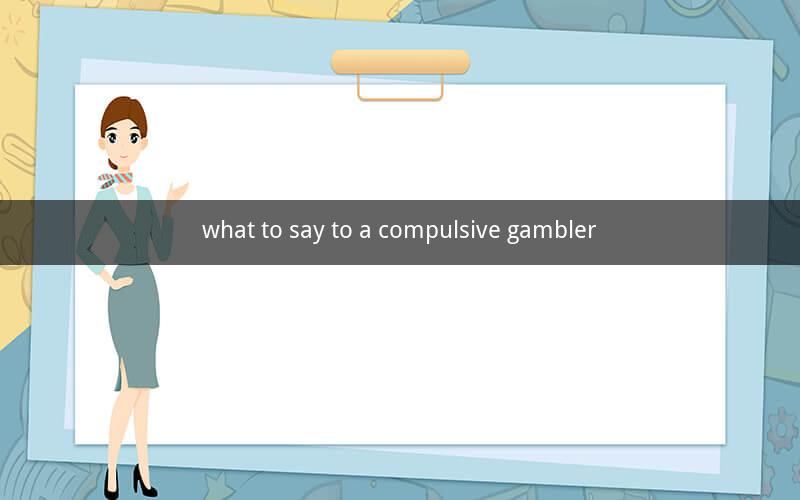
Table of Contents
1. Understanding Compulsive Gambling
2. The Importance of Communication
3. Approaching the Conversation
4. Expressing Concern and Support
5. Encouraging Professional Help
6. Avoiding Judgment and Blame
7. Providing Resources and Information
8. Maintaining Boundaries
9. Understanding the Recovery Process
10. Long-term Support
1. Understanding Compulsive Gambling
Compulsive gambling is a serious condition characterized by an irresistible urge to gamble, despite harmful negative consequences or a desire to stop. It is a form of addictive behavior that can affect individuals of all ages, backgrounds, and socioeconomic statuses. Understanding the nature of compulsive gambling is crucial when considering how to communicate with a compulsive gambler.
2. The Importance of Communication
Effective communication is key in helping a compulsive gambler. It is essential to approach the conversation with empathy, patience, and understanding. Open, honest dialogue can foster trust and encourage the individual to seek help.
3. Approaching the Conversation
When initiating a conversation about compulsive gambling, it is important to choose a private, comfortable setting. Allow the individual to express their feelings and concerns without interruption. Avoid being confrontational or accusatory, as this may lead to defensiveness.
4. Expressing Concern and Support
Express your concern for the individual's well-being and emphasize your support. Let them know that you are there for them and willing to help them through this difficult time. Use "I" statements, such as "I am worried about you" or "I care about your health and happiness," to convey your feelings without placing blame.
5. Encouraging Professional Help
Encourage the compulsive gambler to seek professional help from a therapist, counselor, or support group. Explain that therapy can provide them with the tools and support they need to overcome their addiction. Offer to assist them in finding appropriate resources or accompanying them to appointments.
6. Avoiding Judgment and Blame
Judgment and blame can exacerbate the individual's feelings of guilt and shame, making it more difficult for them to seek help. Instead, focus on understanding the underlying factors contributing to their gambling addiction, such as stress, anxiety, or depression.
7. Providing Resources and Information
Offer information about compulsive gambling, including its symptoms, consequences, and treatment options. Provide resources such as helplines, websites, and support groups. Encourage the individual to explore these resources and learn more about their condition.
8. Maintaining Boundaries
It is important to maintain healthy boundaries while supporting a compulsive gambler. Avoid enabling their behavior by covering their debts or providing financial assistance. Instead, focus on helping them develop coping strategies and build a support network.
9. Understanding the Recovery Process
Recovery from compulsive gambling is a long and challenging process. Encourage the individual to be patient with themselves and to seek ongoing support. Understand that relapses may occur, but they are not a reflection of the individual's worth or determination.
10. Long-term Support
Long-term support is crucial for the success of a compulsive gambler's recovery. Continue to offer your support, even after they have sought professional help. Attend family therapy sessions, if available, to address any family dynamics that may contribute to the individual's gambling addiction.
Questions and Answers
1. Q: How can I tell if someone has a gambling problem?
- A: Look for signs such as secretive behavior, financial difficulties, neglect of responsibilities, and preoccupation with gambling.
2. Q: Should I confront the compulsive gambler about their problem?
- A: It may be more effective to approach the conversation with empathy and support rather than confrontation.
3. Q: Can compulsive gambling be cured?
- A: Compulsive gambling is a chronic condition, but it can be managed with proper treatment and support.
4. Q: What can I do to help a compulsive gambler recover?
- A: Encourage them to seek professional help, provide emotional support, and maintain healthy boundaries.
5. Q: Is it my responsibility to pay off the compulsive gambler's debts?
- A: It is not your responsibility to pay off their debts. Encourage them to take responsibility for their actions and seek financial counseling.
6. Q: How can I support a compulsive gambler during their recovery?
- A: Continue to offer your support, attend support group meetings, and be patient with their progress.
7. Q: Can compulsive gambling lead to other mental health issues?
- A: Yes, compulsive gambling can be associated with other mental health issues, such as depression, anxiety, and substance abuse.
8. Q: What should I do if the compulsive gambler refuses to seek help?
- A: Continue to offer your support and encourage them to seek help, but be prepared for resistance. Consider seeking guidance from a professional.
9. Q: Can family therapy help in treating compulsive gambling?
- A: Yes, family therapy can be beneficial in addressing family dynamics and supporting the individual's recovery.
10. Q: How long does it take to recover from compulsive gambling?
- A: Recovery from compulsive gambling is a long-term process, with varying timelines for each individual.